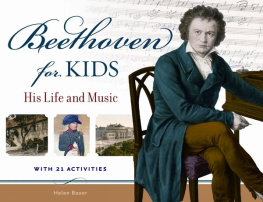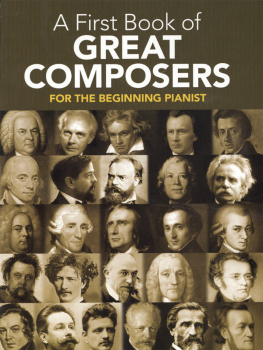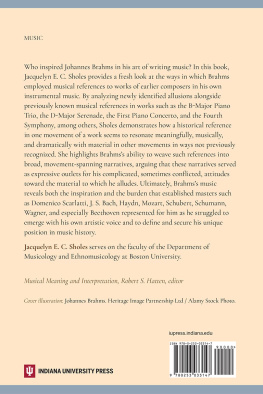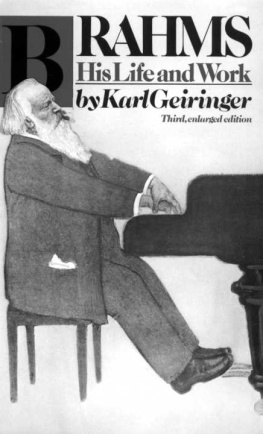Kira Thurman - Singing Like Germans: Black Musicians in the Land of Bach, Beethoven, and Brahms
Here you can read online Kira Thurman - Singing Like Germans: Black Musicians in the Land of Bach, Beethoven, and Brahms full text of the book (entire story) in english for free. Download pdf and epub, get meaning, cover and reviews about this ebook. year: 2021, publisher: Cornell University Press, genre: Politics. Description of the work, (preface) as well as reviews are available. Best literature library LitArk.com created for fans of good reading and offers a wide selection of genres:
Romance novel
Science fiction
Adventure
Detective
Science
History
Home and family
Prose
Art
Politics
Computer
Non-fiction
Religion
Business
Children
Humor
Choose a favorite category and find really read worthwhile books. Enjoy immersion in the world of imagination, feel the emotions of the characters or learn something new for yourself, make an fascinating discovery.
- Book:Singing Like Germans: Black Musicians in the Land of Bach, Beethoven, and Brahms
- Author:
- Publisher:Cornell University Press
- Genre:
- Year:2021
- Rating:4 / 5
- Favourites:Add to favourites
- Your mark:
- 80
- 1
- 2
- 3
- 4
- 5
Singing Like Germans: Black Musicians in the Land of Bach, Beethoven, and Brahms: summary, description and annotation
We offer to read an annotation, description, summary or preface (depends on what the author of the book "Singing Like Germans: Black Musicians in the Land of Bach, Beethoven, and Brahms" wrote himself). If you haven't found the necessary information about the book — write in the comments, we will try to find it.
Kira Thurman: author's other books
Who wrote Singing Like Germans: Black Musicians in the Land of Bach, Beethoven, and Brahms? Find out the surname, the name of the author of the book and a list of all author's works by series.
Singing Like Germans: Black Musicians in the Land of Bach, Beethoven, and Brahms — read online for free the complete book (whole text) full work
Below is the text of the book, divided by pages. System saving the place of the last page read, allows you to conveniently read the book "Singing Like Germans: Black Musicians in the Land of Bach, Beethoven, and Brahms" online for free, without having to search again every time where you left off. Put a bookmark, and you can go to the page where you finished reading at any time.
Font size:
Interval:
Bookmark:
Cornell University Press
Ithaca and London
To my parents, Don and Carol Thurman
Choosing to write a hundred-year-long transatlantic interdisciplinary history between three countries was perhaps not the wisest decision I ever made. But encouraging feedback from teachers, colleagues, and friends convinced me that it was the right one. The reason why this book exists today has everything to do with the people and institutions who have supported this endeavor.
The book first began as a conversation with Beverly Weber, who told me that I could, in fact, research and write about the history of Black people in German-speaking Europe. Celia Applegate was kind, enthusiastic, and generous in her support for my research. Because she never doubted me, I never doubted myself. I benefitted greatly from the guidance and insights of Jean Pedersen and Ralph Locke.
The Fulbright Program, the Botstiber Foundation, and a faculty research grant from the University of Akron gave me the funding to visit archives in Germany, Austria, and the United States. Residential fellowships through the Peters Fellowship at the University of Notre Dame, the American Academy in Berlin, the Institute for Cultural Studies in Vienna (IFK), and the Institute for Advanced Study in Princeton provided me with precious time and space to sit down, flail about, and try to put words on a page. The AMS 75 PAYS Fund of the American Musicological Society, supported in part by the National Endowment for the Humanities and the Andrew W. Mellon Foundation, provided me with a publication subvention to pay for the images that appear in this book.
My project would have been impossible to execute if not for the digitization of Black historical newspapers, which occurred right when I began to look more earnestly for the musicians who lived and worked in Germany and Austria. Instead of trying to find needles in haystacks upon my arrival to German-speaking Europe in 2009, I was able to visit archives with exact names and dates and confirm my hunch that more Black classical musicians had performed in Germany and Austria than secondary scholarship suggested.
This project is based on documents I was able to find in those archives. In Germany, I received support from the Akademie der Knste Archives (especially Peter Konopatsch and Petra Uhlmann), the Bayerische Staatsbibliothek, the Berliner Philharmoniker archive at the Staatliche Institut fr Musikforschung, the Bundesarchiv Berlin-Lichterfelde, the University of Music and Theater Felix Mendelssohn Bartholdy (HMT) Leipzig Archives (many thanks to Ingrid Jach), the Monacensia Library of the Mnchner Stadtbibliothek, the Richard Wagner Museum, the Music and Newspaper Departments of the Staatsbibliothek zu BerlinPreuischer Kulturbesitz, and the Berlin University of the Arts (UdK) Archive (Antje Kalcher). Yolande Korb at the American Academy in Berlin also aided me with my research in the fall of 2017. In Austria, Peter Poltun at the Vienna State Opera Archives, Dr. Silvia Kargl at the Historical Archives of the Vienna Philharmonic, and the archivists at the Vienna City Library also helped me find documents for the book.
Archivists in the United States have also been generous with their knowledge and support. I am especially indebted to Romie Minor and Carla Raczek at the Detroit Public Library; the late and great Beth Howse, as well as Chantel Clark, DeLisa Harris, and Brynna Farris at Fisk Universitys Special Collections; Sierra Dixon at the Connecticut Historical Society; and Holly Smith and Kassandra Ware at Spelman College, who pointed me in the direction of Josephine Harreld Loves letters home to her parents from Salzburg in 1935. April James, Eric Dillalogue, and John Pollack at the Kislak Center for Special Collections, Rare Books, and Manuscripts at the University of Pennsylvania and Brittany Newberry and Tiffany Atwater Lee at the Robert W. Woodruff Library went above the call of duty.
As an assistant professor at the University of Akron, I benefitted from the leadership and guidance of my colleagues Stephen Harp, Constance Bouchard, Janet Klein, and Toja Okoh. At the University of Michigan, I was fortunate to find community in both the German and History departments. My German colleaguesKerstin Barndt, Julia Hell, Johannes von Moltke, Andreas Gailus, Kristin Dickinson, Tyler Whitney, Scott Spector, Helmut Puff, and Peter McIsaacwere kind and thoughtful in their criticisms. In History, my colleagues Kathleen Canning, Geoff Eley, Joshua Cole, Pamela Ballinger, Rita Chin, Stephen Berrey, Dario Gaggio, Paulina Alberto, Kisha Simmons, and Jesse Hoffnung-Garskof were generous with their feedback and support.
Three workshops have also shaped the outcome of this book. In addition to a workshop at Michigan organized by LSA and led by Scotti Parish, I benefitted from a second that generated new directions in my work while also better anchoring it. Joy Calico and Andrew Zimmerman were pivotal interlocutors who made sense of what I had produced at a time when I still couldnt quite see the forest through the trees. A third workshop, funded by the Thyssen Foundation that I co-organized with Stefan Hbner in the summer of 2017, brought wonderful colleagues together from around the world to read my work and show me how to make it better.
Friends and colleagues in different disciplines have contributed to this project in intangible ways. In musicology, I thank Alex Stefaniak, Douglas Shadle, Kristen Turner, Kim Hannon Teal, Emily Richmond Pollock, Naomi Andr, Lauron Kehrer, Laurie McManus, and Lucy Caplan for enriching my work. In German history and German studies, Eve Rosenhaft, Jeff Bowersox, Priscilla Layne, Jonathan Wipplinger, Tiffany Florvil, Maureen Gallagher, and the Rosa Luxemburg Group (Willeke Sandler, Jen Lynn, Deb Barton, Lauren Stokes, and Julie Ault) made my book stronger and my arguments more focused.
Over the years, writing buddies Aimee Slaughter, William Calvo-Quirs, Julian Lim, Aglaya Glebova, Sugi Ganeshananthan, and Anne-Marie Angelo have been there to make sure that I got out of bed, grabbed a cup of coffee, and got to work. I am forever grateful to the Black communities in Berlin and Vienna (especially ADEFRA, Soul Sisters Berlin, and the Black People in Vienna Facebook group) for being my anchors of support while I was conducting and writing my research in Germany and Austria.
Anna Rose Nelson transcribed the musical scores that appear in this book; as a graphic designer Laura Koroncey was a terrific pinch-hitter in the last inning. Emily Andrew has been a dream editor at Cornell University Press, and I am so thankful for her kindness, intellect, and musical curiosity. Jennifer Savran Kelly, Julia Cook, and Allegra Martschenko made the publication process smooth and efficient. I am indebted to Hilary Bown, my editor, warrior, and friend who has read every single word Ive put to the page since 2013.
Lastly, I thank my family for their care, love, and support on this long journey to publication. I know that in my darkest hour, I can always turn to my brother Jonathan Thurman to provide me with a funny meme, usually mined from the deep archives of Black Twitter. His insouciance reminds me to lighten up a little; its just a book. Erica Haldi is the most obnoxious cheerleader and best big sister a scholar could ask for. My nieces Ellie and Lia are two of my greatest inspirations. Joel Bentley demonstrates every day the true meaning of partnership. My parents, Don and Carol Thurman, have made countless sacrifices for the sake of their children. This book is not only a manifestation of their hard work but an expression of my profound gratitude.
Note on Translation
Font size:
Interval:
Bookmark:
Similar books «Singing Like Germans: Black Musicians in the Land of Bach, Beethoven, and Brahms»
Look at similar books to Singing Like Germans: Black Musicians in the Land of Bach, Beethoven, and Brahms. We have selected literature similar in name and meaning in the hope of providing readers with more options to find new, interesting, not yet read works.
Discussion, reviews of the book Singing Like Germans: Black Musicians in the Land of Bach, Beethoven, and Brahms and just readers' own opinions. Leave your comments, write what you think about the work, its meaning or the main characters. Specify what exactly you liked and what you didn't like, and why you think so.












